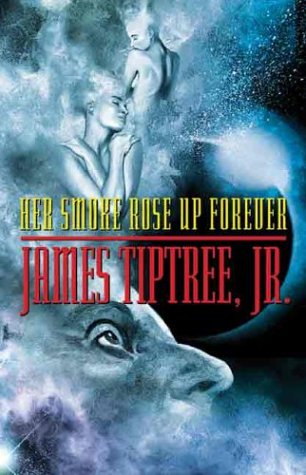I own copy of the second (1979) edition of James Tiptree Jr.’s collection Warm Worlds and Otherwise, which contains an insightful and interesting introduction by Robert Silverberg. Silverberg’s introduction, while generally terrific, is wrong about two things. He’s famously wrong about her “ineluctable masculinity”—in this second edition he backs down as graciously and sincerely as anyone ever has. If you want a model of how to acknowledge your public mistakes with grace, you could do a lot worse. The other mistake he makes is in assuming that Tiptree will someday write a novel, and that novel will be even better than the short stories he’s praising. Tiptree did cobble together a couple of novels later in her career, and I quite like them, though they do not have the novel nature. Some people are natural short story writers, and I think this may have been a more inherent and significant thing about Tiptree than her gender. Tiptree wrote some of the best short stories the field has ever seen, stories that are unforgettable, the kind of story that gets under your skin and keeps coming back. There’s a weird belief that short stories are somehow inferior to novels, are beginner’s work, when in fact they are their own thing. Some writers excel at all lengths, others have natural lengths. Tiptree’s natural length was the short story. She seldom extended even to novellas and novelets. She built whole memorable universes and characters to inhabit them in remarkably few words, and that was part of her genius.
Warm Worlds and Otherwise is out of print, but her “best of” collection, Her Smoke Rose Up Forever is still available, and I recommend it. Re-reading a short story collection I always find myself identifying themes and motifs. Tiptree wrote a lot about aliens and being alienated, but the strongest theme I can see is the yearning for the unattainable. All of these stories have characters yearning for what they cannot have, whether it’s Timor and his lost paradise planet in “The Milk of Paradise,” or P. Burke and her perfect robot body in “The Girl Who Was Plugged In,” or the humans and their desire for alien sex in “And I Awoke and Found me Here,” or the unbearable biological imperatives of the aliens in “Love is the Plan, the Plan is Death.” What unites Tiptree’s stories is the skilful blending of SFnal concepts with this overpowering yearning for something forever out of reach.
I’ve read Julie Phillips’ biography of Tiptree and while I thought it was in many ways brilliant, I couldn’t help feeling that Phillips underestimated the value of Tiptree’s work. Phillips is interested in how Alice Sheldon constructed the persona of James Tiptree Jr., and that is indeed interesting. Phillips is interested in the way that being Tiptree let Sheldon write, where before she hadn’t been able to, and not just write but communicate with other writers. I’m much more interested in the way that science fiction let her write, in the way she could find a way to write about her experiences as someone alienated from the world and find that writing welcomed. Delany talks about how science fiction can transform a sentence like “she turned on her side” from the boring restlessness of a sleepless night to the activation of the cyborg. In the same way Sheldon’s inchoate longing for something impossible to articulate was alchemised through Tiptree’s science fiction writing.
Tiptree’s stories really are brilliant—I loved them when I was a teenager, I love them now. She did things that hadn’t been done before, she expanded the edges of possibility for the field. Phillips wasn’t really interested in Tiptree’s influence in our genre, and so far as she was she wanted to talk about the Tiptree Award and gender and so on, which is all really related to Sheldon personally, and not so much to Tiptree as a writer. Tiptree did write “The Women That Men Don’t See” and “Morality Meat” but gender and “female issues” were far from central to her concerns. I think one of the things being Tiptree gave her was permission to step away from this sort of thing, permission to write as “normal” (it was 1970) and unmarked, to be who she was, to be a person away from the confines of being a female. There’s this thing that happens with acknowledging and sequestering women’s stuff at the same time, and she escaped that.
Tiptree was constantly pushing the boundaries of science fiction. “The Girl Who Was Plugged In” (1973) prefigured cyberpunk—it’s one of the three precursor stories, with John M. Ford’s Web of Angels and John Brunner’s The Shockwave Rider. “Love is the Plan, the Plan is Death” made a space for Octavia Butler’s later writing about aliens and sex and identity. “And I Awoke and Found me Here” did the same for Varley—for a lot of the writers who came into SF in the later seventies and the eighties Tiptree was part of their defining space, and the genre would have been very different without her. Science fiction is constantly a dialogue, and her voice was one of the strongest in the early seventies, when everything was changing. She wasn’t a New Wave writer, and in many ways she was very traditional, “And I Have Come Upon This Place” could have been written by Murray Leinster, except for the end. She wrote what she wrote and expanded the possibilities for all of us. Science fiction would be very different without her.
Jo Walton is a science fiction and fantasy writer. She’s published eight novels, most recently Half a Crown and Lifelode, and two poetry collections. She reads a lot, and blogs about it here regularly. She comes from Wales but lives in Montreal where the food and books are more varied.










